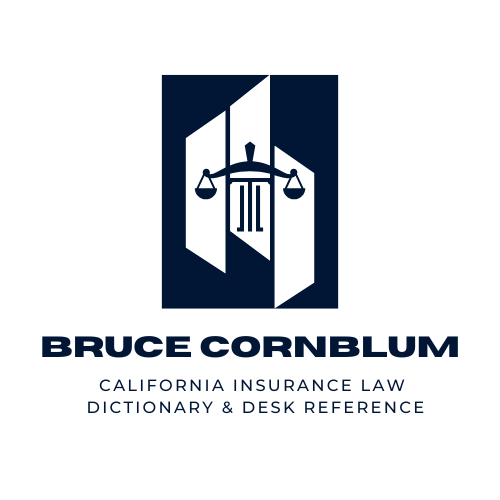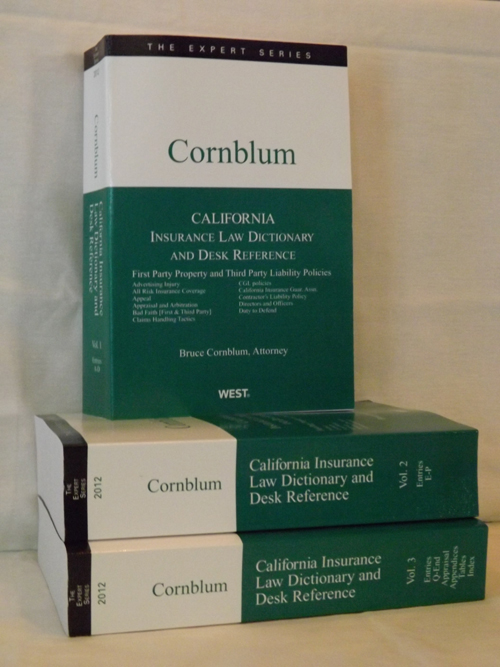§ C151:1 In general
In 1988, the California Legislature declared that it is a violation of public policy for a policy to provide any duty to defend: (1) any claim in any criminal action or proceeding, or (2) any action or proceeding brought pursuant to Business and Professions Code § 17200 or § 17500 in which the recovery of a fine, penalty, or restitution is sought by the Attorney General, any district attorney, any county counsel. [Insurance Code § 533.5(b), (c), (d)]
§ C151:1.1 Statutory exceptions
The legislature has enacted statutes authorizing insurance that provides a defense for individual defendants in various kinds of proceedings, including criminal proceedings. [Mt. Hawley Ins. v. Lopez (2013) 215 Cal.App.4th 1385, 1419 (discussing Insurance Code § 533.5). See § G16 GOVERNMENT EMPLOYEE – RIGHT TO DEFENSE FOR INDEMNITY FROM GOVERNMENT EMPLOYER.
Corporations Code § 317
Corporations Code § 317 authorizes a corporation to indemnify certain of its agents against “expenses, judgments, fines, settlements, and other amounts”, including “expenses actually and reasonably incurred by that person in connection with the defense or settlement of the action …”. [Corporations Code § 317(b)(c)] Corporations Code § 317 applies to criminal proceedings against the agent as long as “that person acted in good faith and in a manner the person believed to be in the best interest of the corporation and, in the case of a criminal proceeding, had no reasonable cause to believe the conduct of the person was unlawful”. [Corporations Code § 317(a)(b); PS & S Inc. v. Superior Court (1971) 17 Cal.App.3d 354, 359] Corporations Code § 317 (i) further provides that the corporation “shall have the power to purchase and maintain on behalf of any agent of the corporation against any liability asserted against or incurred by the agent in that capacity or arising out of the agent’s status. Thus, Corporations Code § 317 embodies a policy decision by the Legislature to allow the insurers to in certain circumstances provide a defense in criminal actions or proceedings.” [Mt. Hawley Ins. v. Lopez (2013) 215 Cal.App.4th 1385, 1420] See § D49 DIRECTORS AND OFFICERS LIABILITY POLICY [§ D49:1.01 Criminal defense under D&O policy].
Government Code § 990
Government Code § 990 provides that a local public entity may insure, contract or provide against the expense of defending a claim against the local public entity or its employee … where such liability arose from an act or omission in the scope of his employment, and an insurance contract for such purpose is valid and binding notwithstanding Civil Code § 1668, Insurance Code § 533, or any other provision of law. [Government Code § 990(c); Mt. Hawley Ins. v. Lopez (2013) 215 Cal.App.4th 1385, 1421]
Government Code § 995
Government Code § 995 provides that, subject to statutory exceptions, a public entity is generally required to provide for the defense of a civil action brought against an employee or former employee, on accounts of an act or omission in the scope of the employee’s employment.
Government Code § 995.2
A public entity may refuse to provide an employee or former employee with a defense to a civil action if the public entity determines:
(1) that the act or omission was not within the scope of the employee’s employment,
(2) that the employee acted or failed to act because of actual fraud, corruption, or actual malice;
(3) the defense of the action by the public employee would create a conflict of interest between the public entity and the employee or former employee. [Government Code § 995.2(a); also see City of Bell v. Superior Court (2013) 220 Cal.App.4th 236, 243-244 (denial of a defense and indemnity occurred)]
Government Code § 995.8
Government Code § 995.8 provides that “a public entity may provide for a defense of a criminal action or proceeding … brought against an employee or former employee if the criminal action or proceeding is brought on account of an act or omission in the scope of employment as an employee of the public entity”. Government Code § 995.8 declares that public entities are not required to provide for a defense of criminal actions brought against their employees, but instead permits the entities to provide defenses in certain circumstances. See Los Angeles Police Protective League v. City of Los Angeles (1994) 27 Cal.App.4th 168, 176; Mt. Hawley Ins. v. Lopez (2013) 215 Cal.App.4th 1385, 1421] See § G16 GOVERNMENT EMPLOYEE – RIGHT TO DEFENSE OR INDEMNITY FROM GOVERNMENT EMPLOYER.
Government Code § 996.6
Government Code § 996.6 provides that: “The rights of an employee or former employee under this part are in addition to and not in lieu of any rights he may have under any contract or under any other enactment provided for his defense.”
◆ OBSERVATION [Interpretation of Government Code § 996.6]:
Government Code § 996.6 simply provides that a public entity’s defense obligations as set forth in the Tort Claims Act are in addition to any other contractual rights the public employee may have to a defense. Government Code § 996.6 does not permit a public entity to provide a defense where other sections of the Tort Claims Act would prohibit such a defense. Government Code § 996.6 is read with Government Code § 995.8. Government Code § 995.8 prevents a public entity from providing its employee a defense to a criminal action unless the public entity determines that the defense would be in the best interest of the public entity and that the public employee had acted in good faith and without malice. [City of Bell v. Superior Court (2013) 220 Cal.App.4th 236, 258-259]
A public entity cannot agree in advance that any time its public employee is subsequently charged with a crime, the provision of a defense would be in the best interest of the public employee and the public employee will have acted in good faith and without malice. These are determinations which, by necessity, must be made on a case by case basis, after the criminal prosecution has begun. [City of Bell v. Superior Court (2013) 220 Cal.App.4th 236, 239, fn. 23]
Directors and Officers insurance
Allowing insurers to provide for defense costs in criminal cases against corporate agents enhances the ability of for-profit and non-profit organizations to attract directors, trustees and volunteers who otherwise might hesitate or decline to serve because of fear of lawsuits and criminal prosecutions. [Mt. Hawley Ins. v. Lopez (2013) 215 Cal.App.4th 1385, 1422] Unless directors can rely on the protections given by D&O policies, good and competent men and women will be reluctant to serve on corporate boards. [In re World Com Inc. Securities Litigation (S.D.N.Y. 2005) 354 F.Supp.2d 455, 469, quoted in Mt. Hawly Ins. v. Lopez, supra] Corporate managers insist on D&O insurance to protect their personal wealth from the risk of shareholder litigation, making such coverage necessary to attract qualified persons to serve on the corporate board and on the executive level. [Mt. Hawley Ins. v. Lopez (2013) 215 Cal.App.4th 1385, 1422] See § D49 DIRECTORS AND OFFICERS LIABILITY POLICY [§ D49:1.01 Criminal defense under D&O policy].
References in bold are to Mr. Cornblum’s legal text CALIFORNIA INSURANCE LAW DICTIONARY AND DESK REFERENCE, published by ThomsonReuters (1-800-344-5008). Those with WestLaw can search using the database CAINLAWDDR.

